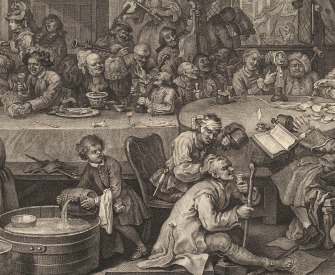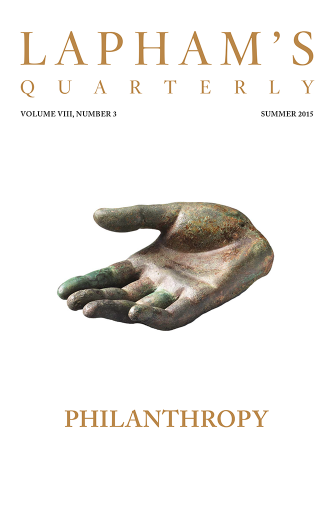No man but a blockhead ever wrote, except for money.
—Samuel Johnson, 1776A Cheap Coat Makes a Cheap Man
Thorstein Veblen explains honorific waste.
What has been said of the influence of the law of conspicuous waste upon the canons of taste will hold true, with but a slight change of terms, of its influence upon our notions of the serviceability of goods for other ends than the aesthetic one. Goods are produced and consumed as a means to the fuller unfolding of human life, and their utility consists, in the first instance, in their efficiency as means to this end. The end is, in the first instance, the fullness of life of the individual, taken in absolute terms. But the human proclivity to emulation has seized upon the consumption of goods as a means to an invidious comparison, and has thereby invested consumable goods with a secondary utility as evidence of relative ability to pay. This indirect or secondary use of consumable goods lends an honorific character to consumption and presently also to the goods which best serve this emulative end of consumption. The consumption of expensive goods is meritorious, and the goods which contain an appreciable element of cost in excess of what goes to give them serviceability for their ostensible mechanical purpose are honorific. The marks of superfluous costliness in the goods are therefore marks of worth—of high efficiency for the indirect, invidious end to be served by their consumption; and conversely, goods are humilific, and therefore unattractive, if they show too thrifty an adaptation to the mechanical end sought and do not include a margin of expensiveness on which to rest a complacent invidious comparison. This indirect utility gives much of their value to the “better” grades of goods. In order to appeal to the cultivated sense of utility, an article must contain a modicum of this indirect utility.
While men may have set out with disapproving an inexpensive manner of living because it indicated inability to spend much, and so indicated a lack of pecuniary success, they end by falling into the habit of disapproving cheap things as being intrinsically dishonorable or unworthy because they are cheap. As time has gone on, each succeeding generation has received this tradition of meritorious expenditure from the generation before it, and has in its turn further elaborated and fortified the traditional canon of pecuniary reputability in goods consumed, until we have finally reached such a degree of conviction as to the unworthiness of all inexpensive things that we have no longer any misgivings in formulating the maxim, “Cheap and nasty.” So thoroughly has this habit of approving the expensive and disapproving the inexpensive been ingrained into our thinking that we instinctively insist upon at least some measure of wasteful expensiveness in all our consumption, even in the case of goods which are consumed in strict privacy and without the slightest thought of display. We all feel, sincerely and without misgiving, that we are the more lifted up in spirit for having, even in the privacy of our own household, eaten our daily meal by the help of hand-wrought silver utensils, from hand-painted china (often of dubious artistic value) laid on high-priced table linen. Any retrogression from the standard of living which we are accustomed to regard as worthy in this respect is felt to be a grievous violation of our human dignity. So, also, for the last dozen years candles have been a more pleasing source of light at dinner than any other. Candlelight is now softer, less distressing to well-bred eyes, than oil, gas, or electric light. The same could not have been said thirty years ago, when candles were, or recently had been, the cheapest available light for domestic use. Nor are candles even now found to give an acceptable or effective light for any other than a ceremonial illumination.
A political sage still living has summed up the conclusion of this whole matter in the dictum: “A cheap coat makes a cheap man,” and there is probably no one who does not feel the convincing force of the maxim.
The habit of looking for the marks of superfluous expensiveness in goods, and of requiring that all goods should afford some utility of the indirect or invidious sort, leads to a change in the standards by which the utility of goods is gauged. The honorific element and the element of brute efficiency are not held apart in the consumer’s appreciation of commodities, and the two together go to make up the unanalyzed aggregate serviceability of the goods. Under the resulting standard of serviceability, no article will pass muster on the strength of material sufficiency alone. In order to completeness and full acceptability to the consumer, it must also show the honorific element. It results that the producers of articles of consumption direct their efforts to the production of goods that shall meet this demand for the honorific element. They will do this with all the more alacrity and effect, since they are themselves under the dominance of the same standard of worth in goods, and would be sincerely grieved at the sight of goods which lack the proper honorific finish. Hence it has come about that there are today no goods supplied in any trade which do not contain the honorific element in greater or less degree. Any consumer who might, Diogenes-like, insist on the elimination of all honorific or wasteful elements from his consumption, would be unable to supply his most trivial wants in the modern market. Indeed, even if he resorted to supplying his wants directly by his own efforts, he would find it difficult if not impossible to divest himself of the current habits of thought on this head; so that he could scarcely compass a supply of the necessaries of life for a day’s consumption without instinctively and by oversight incorporating in his homemade product something of this honorific, quasi-decorative element of wasted labor.

Thorstein Veblen
From The Theory of the Leisure Class. A professor of economics attuned to American pecuniary decency in the Gilded Age, Veblen lectured at the University of Chicago as well as the New School for Social Research in New York City. He introduced his students to the concepts of “conspicuous consumption” and “honorific waste.”



